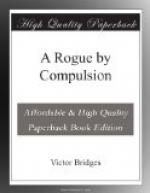“Glad!” I echoed. “I shall be so delighted, I shall probably blow myself up. It’s you two I’m thinking of. The more I see of this job the more certain I am there’s something queer about it, and if there’s going to be any trouble down there I don’t want you and Joyce dragged into it.”
“We shan’t want much dragging,” returned Tommy. “As far as the firm’s business goes we’re all three in the same boat. We settled that last night.”
“So there’s nothing more to be said,” added Joyce complacently.
I looked from one to the other. Then I laughed and shrugged my shoulders. “No,” I said, “I suppose there isn’t.”
Through the interminable slums of Plaistow and East Ham we drew out in the squalid region of Barking Creek, and I looked down on the mud and the dirty brown water with a curious feeling of satisfaction. It was like meeting an old friend again after a long separation. The lower Thames, with its wharves, its warehouses, and its never-ceasing traffic, had always had a strange fascination for me; and in the old days, when I wanted to come to Town from Leigh or Port Victoria, I had frequently sailed my little six-tonner, the Penguin, right up as far as the Tower Bridge. I could remember now the utter amazement with which George had always regarded this proceeding.
“Are you feeling pretty strong this morning?” asked Tommy, breaking a long silence. “The Betty’s lying out in the Ray, and the only way of getting at her will be to tramp across the mud. There’s no water for another four hours. We shall have to take turns carrying Joyce.”
“You won’t,” said Joyce. “I shall take off my shoes and stockings and tramp too. I suppose you’ve got some soap on board.”
“You’ll shock Leigh terribly if you do,” said Tommy. “It’s a beautiful respectable place nowadays—all villas and trams and picture palaces—rather like a bit of Upper Tooting.”
“It doesn’t matter,” said Joyce. “I’ve got very nice feet and ankles, and I’m sure it’s much less immoral than being carried in turns. Don’t you think so, Neil?”
“Certainly,” I said gravely. “No properly-brought-up girl would hesitate for a moment.”
We argued over the matter at some length: Tommy maintaining that he was the only one of the three who knew anything about the minds of really respectable people—a contention which Joyce and I indignantly disputed. As far as I can remember, we were still discussing the point when the train ran into Leigh station and pulled up at the platform.
“Here you are,” said Tommy, handing me a basket. “You freeze on to this; it’s our lunch. I want to get a couple more cans of paraffin before we go on board. There is some, but it’s just as well to be on the safe side.”
We left the station, and walking a few yards down the hill, pulled up at a large wooden building which bore the dignified title of “Marine and Yachting Stores.” Here Tommy invested in the paraffin and one or two other trifles he needed, and then turning off down some slippery stone steps, we came out on the beach. Before us stretched a long bare sweep of mud and sand, while out beyond lay the Ray Channel, with a number of small boats and fishing-smacks anchored along its narrow course.




